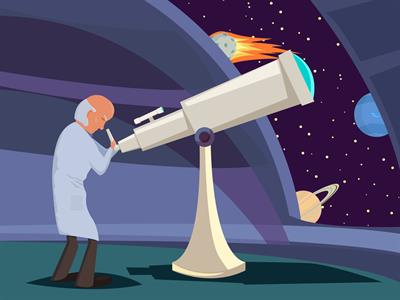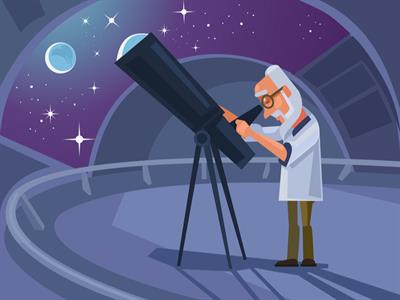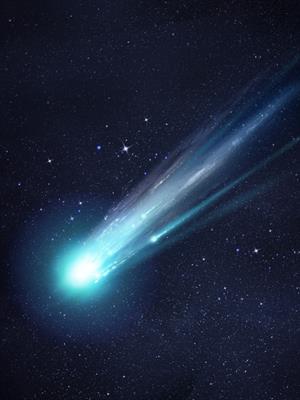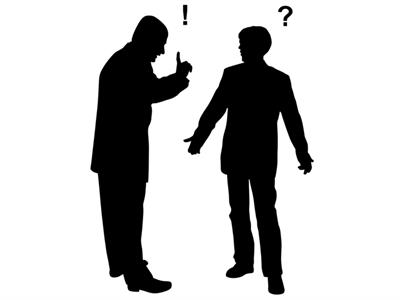
PUMPA - SMART LEARNING
எங்கள் ஆசிரியர்களுடன் 1-ஆன்-1 ஆலோசனை நேரத்தைப் பெறுங்கள். டாப்பர் ஆவதற்கு நாங்கள் பயிற்சி அளிப்போம்
Book Free DemoThe story, "The comet I", is about an amateur scientist, Duttada, and his discovery. Duttada was an amateur scientist who lived on the outskirts of Calcutta. His wife was Indrani Debi. The narration starts with a cold December no-moon night. A cold wind awakened Indrani Debi up, and in her half-sleep, she saw the pillow next to her was empty. The answer was self-evident. Duttada, her husband, was not there.
Indrani Debi knew where he would be. She assumed Duttada had gone to visit Dibya when he was found to be not there in his room. She felt bad for her husband, who had gone upstairs without even locking the door. She couldn't suppress her smile even as she grumbled about Duttada. She was well aware of her husband's complete lack of awareness of practical problems. She knew her husband's mind was fully occupied with Dibya and his work. She was concerned about her husband, who, despite the doctor's suggestion to protect himself from the cold, didn't bother to put on his sweater, which was lying on his bedside chair. Indrani Debi blamed Dibya, believing that she had caused Duttada to become so oblivious to everything around him that he had forgotten to put on his sweater.

Duttada's wife in half sleep
Indrani was upset with her husband, Duttada, as he spent more time with Dibya than with her. She wrapped herself in a shawl, which was important in the cold weather, and ascended the stairs to the rooftop, looking to find her husband and disturb their (Duttada and Dibya's) private meeting. As Indrani ascended the stairs, she found Dibya and Duttada gathered together, eye to eye, and Duttada was staring into Dibya's eyes. Who was Dibya? Though the author refers to 'Dibya' as 'she,' Dibya is actually an object and not a woman.

Duttada with his telescope
As Indrani predicted earlier, Duttada was working with his telescope, "Dibya". Dibya was an eight-inch telescope that acted as Duttada's soulmate. When Duttada got the telescope (Dibya), he was so thrilled that he named it 'Dibya Chakshu,' which means 'Divine eye,' since it would allow him to see heavenly bodies that the human eye could not see. Duttada believed that Dibya would help him achieve his aim. It was the other way around with his wife, Indrani Debi. The telescope (Dibya) looked to Indrani as a designing woman, trapped Duttada to achieve his ambition without thinking about anything else. So, she just called it 'Dibya'.
This eight-inch telescope held a special place in Duttada's heart since it meant everything to him and enabled him to meet his requirements. He had a secret goal in life that he hoped to accomplish with the aid of his beloved Dibya Chakshu.
Despite his lack of expertise as an astronomer, he was eager to get a telescope so that he could watch the stars. He also desired some free time in order to observe the celestial bodies. Both of his dreams came true once he retired, since he was free to conduct his work after retirement and the money he received at the time of retirement allowed him to buy a telescope. And, Dibya suited his needs. We can now understand why Duttada's wife was envious of his eight-inch telescope, as Duttada had spent more time on Dibya Chakshu gazing at stars. And, those dark nights seemed so long to Indrani Debi since she was alone without her husband.

Duttada observing stars
When Duttada's wife arrived upstairs, she handed him the sweater that Duttada had forgotten to wear as the doctor (Nabin Babu) had advised. The next paragraph discloses Duttada's lifelong hidden goal. It was nothing more than a wish to find a new comet. These comets usually arrive from far out in the Solar System and they orbit around the sun like asteroids and planets. Even though these comets orbit the sun, their nature differs from that of planets, which is very unusual because, when a comet approaches the sun, the heat forces its gases to evaporate, releasing dust and microparticles. The movement of these components, which form a tail, is influenced by the sun's radiation pressure. The longish tail glows for a short while before disintegrating and fading for many years or centuries.

Comet
In paragraph 9, the author himself posed a question to the readers, namely, 'On what basis did Duttada assume he could discover the comet with Dibya ahead of professional astronomers with massive telescopes?'. Also, we already have experienced astronomers and scientists in the field of astronomy who have a lot of expertise and whose work is far superior to Duttada's.
In paragraph \(10\), the author responds to the query about how an amateur astronomer like Duttada can compete with expert astronomers. The response to the question is as follows. Though there were some experienced scientists and astronomers in the astronomy field, they would be preoccupied with their own tasks and spend time observing and learning about vague, undefined galaxies. As a result, they don't bother to devote time to detecting such comets, and they place a lower priority on it. Indeed, amateur astronomers have repeatedly discovered new comets that professional astronomers have missed in the past. Duttada's positive outlook may be seen in this thought.
Duttada's intuition assured him that it would be a big night. There was something that his telescope pointed at, true to his intuition. He discovered something odd among the twinkling stars that night. He went through the charts again. The term 'chart' here refers to a 'star chart' or 'star map,' which is a night sky map. Astronomical objects like as stars, constellations, and galaxies are identified and located using them. Also, he double-checked everything with his telescope, Dibya. To arrive at the exact conclusion, he utilised his pocket calculator in torchlight once more.
Though Duttada failed at leading a practical life, being oblivious to everyday daily events, he was meticulous in his calculations, paying attention to even the smallest details. As a result, there was no blunder. The faint stranger he saw through his telescope was nothing but a "comet" that has been demanding his time for the last few days, during which he had sleepless nights. Finally, Duttada discovered a comet.
After two days, the news was published in the Ananda Bazar Patrika (an Indian Bengali-language daily newspaper) with the headline "Calcutta Man Discovers New Comet." And the news was that Shri Manoj Dutta, who lived on the outskirts of Calcutta, had discovered a new comet. For the past two days, he had been observing the comet and had informed the IIA (Indian Institute of Astrophysics) in Bangalore. Then, at Kavalur, IIA verified it with their \(90\)-inch telescope, which is the largest on the Asian Continent. The Indian Institute of Astrophysics owns and runs the Vainu Bappu Observatory (Kavalur Observatory), which is an astronomical observatory. It is located near Kavalur, Vaniyambadi in the Tirupattur district of Tamil Nadu, in the Javadi Hills. It's located 200 kilometres south of Chennai and 175 kilometres south of Bangalore.
If Duttada's finding was verified, it would be seen as a pivotal point in his career as an amateur scientist. Duttada also predicted that this comet would be visible to the human eye in the coming months. Last but not least, he dedicated his proud achievement to his beloved 'Dibya,' his eight-inch telescope.
After discovering a new comet, Duttada became a well-known and well-recognized figure around the world in a week's time. After verifying his finding, the IIA named the comet after the discoverer, as was customary. As a result, the comet was given the moniker 'Comet Dutta'.
Duttada had been living a nice, tranquil life as a retired old person on the outskirts of Calcutta until then. Situations began to shift once he got popular, which was not in keeping with his personality. He was a modest, introverted person who never desired fame and instead preferred to spend his time alone, preoccupied with his own job. Even though he had aimed to detect a comet, his sudden popularity was unexpected. He despised the fact that he was popular. He was invited to a number of occasions and receptions. On his way back from a ceremony, he began to mutter, making a point that the comet had not been discovered by him.
As Duttada muttered about being invited to a slew of parties and receptions, he was interrupted by another voice. Duttada's wife was the one who spoke up. Surprisingly, she too agreed with him, but for a different reason. He was surprised by her response and asked her to explain why she hoped he hadn't found the comet.
When Duttada's sweetest, loving wife heard this, she said that she believed comets brought ill-luck home and that a respectable man like her better half should not be associated with such discoveries. Duttada couldn't stop laughing after listening to his wife because his wife was a well-educated woman with an MA degree. Despite her excellent education, she remained superstitious, which made him laugh. Scientific discoveries have made our lives simpler and have provided answers to a variety of problems. Nonetheless, some people hold beliefs that are illogical. He attempted to explain that there was no such thing as a comet posing a threat to our planet. In reality, scientists have thoroughly examined their characteristics. There was nothing to be afraid of with them. There is nothing to get scared of these comets.
When discussing the aforementioned points, Duttada convinced his wife that his discovery, 'Comet Dutta' would also pass by without harming anyone on Earth like other comets. The author here offers the readers a hint that Comet Dutta would not be the same as what Duttada anticipated. This is because the author tells the readers that Comet Dutta would pose a problem.
Section I of the story 'Comet I' recounts the account of Duttada's discovery, while Section II outlines the issues that Comet Dutta was anticipated to cause. The story's next scene has been relocated to the King's College campus in Cambridge. King's College is a constituent college of the University of Cambridge in Cambridge, England. The butler spoke in a gentle voice to the Provost, the college's in-charge, respectfully and handed him an envelope on a silver tray.
The Provost would pass the envelope back to Mr. James and inform him that someone had arrived to meet him urgently. James opened the envelope containing a brief letter on his way to his room to meet the stranger. Mr. Macpherson wrote to him (Dr. James Forsyth), requesting an immediate meeting as he had something important to share with him. Mr. Macpherson's letter highlights two points. Mr. Macpherson and Dr. James Forsyth were about to discuss something crucial. It was also a confidential subject that could not be revealed to anybody. Also, Mr. Macpherson had despatched someone to assist him in getting to Whitehall with that letter. 'Whitehall' is the name of a street in London on which there are many government offices.
He'd been waiting for Mr. James to arrive at his room and take him to Whitehall to see John Macpherson. According to the arrangements, James would spend that night in London. The signature beneath the letter would serve as a message of Macpherson's position to the readers. The Defence Science Advisor, Her Majesty's Government, was written beneath the signature.
A man with a bowler hat stood at the mantlepiece, as expected, waiting for James. He greeted James and took him to his room.

Place near Mantlepiece
The reason was apparent; he had travelled all the way from Whitehall to accompany James, as stated in the letter. And the stranger was none other than a Whitehall security officer. Johnson was his name. Johnson showed his ID card and informed him of the reason for his visit. James told him that he already knew the information from the envelope he had received and that it would not take long to get ready to leave his room.
Even though James was curious to know the reason for the meet with Mr. Macpherson, he didn't want to ask question to Mr. Johnson since it would be useless. Because it was something official and confidential that Mr. John wanted to discuss with James. So, there would not be any possibility that Johnson might be knowing the details.
In Johnson's Ford Cortina, James arrived in Whitehall in less than \(90\) minutes. The Ford Cortina is a vintage car powered by a \(1.6\) Inline \(4\) engine with \(110\) bhp and a top speed of \(104\)mph. They arrived at Sir John Macpherson's chamber in about \(10\) minutes after then. Mr.Johnson departed after bringing James to John's room and introducing James to him.
Sir John began to talk to James by apologising for grabbing his time before informing him of the purpose of their meeting. In addition, he gave James a typescript. James was taken aback when he saw the paper since it was his own. It was the original piece he had written and given to the publication 'Nature.' He was taken aback for a while, unsure how he had gotten the article from the 'Nature' journal.
Sir John noticed his concern and resumed his speech by explaining how he obtained that typescript from the editor of 'Nature,' informing him that he was a friend of Mr. Taylor ('Editor of Nature'). James was perplexed since he had previously told the editor that the news he had indicated in the typescript should be published without any delay because it was significant.
Sir John agreed because he recognised the significance of the information in James' article, but it could not be published for the same reason. Despite the fact that his work was significant, James couldn't understand why it hadn't been accepted. Sir John understood the cause of James' perplexity. He then lit his pipe and informed James that, while he agreed that the information in the article was essential, it couldn't be published for the same reason. The sentences above imply that James' article must be sensational, which causes John to refuse to have it published.
Sir.John's words made James very upset. James was quite sure of his comet predictions. He refused to accept any criticism of his work since he believed he had done it flawlessly and he would not allow it to be repressed without publishing by anybody. James anticipated Mr. John to explain why he prevented his work from being published since he regarded him as a respected scientist.

Discussion between John and James
After seeing James' uneasiness, John began to speak. John told James not to misunderstand him since he had received his (James's) paper. He then began to explain James on how he obtained the original typescript James had provided to the editor of 'Nature', Mr. Taylor. Mr. John and Taylor were friends. Mr. John met Taylor at the club for lunch, where he showed Mr. John his (James') paper. Mr. Taylor requested Mr. John's judgement before sending it to a professional referee since Mr. John was a scientist and still had an interest in astronomy. A professional referee is someone who can testify for your abilities and expertise in your field. When Sir John read the paper, he realised that disclosing what James had mentioned in the paper would cause a lot of havoc throughout the world if the contents in the paper were accurate.
James assured John that the information contained in the paper was accurate. After all, he was confident in his real work, which he completed with great care, accuracy, and commitment. James provided a guarantee of his findings, putting his own reputation on the line, and he knew that if his claim was proven to be false, his reputation would be ruined overnight. James had taken efforts to disclose the information as he believed in his ability. And, so James could neither tolerate criticism on his work nor could he permit it be left without published. Sir. John then asked him whether he realised what would happen if Comet Dutta crashed with the Earth, as James had predicted.

James arguing with John
James answered to him, saying it would result in unimaginable devastation as it would completely destroy the Earth's ecosystem and all living things on it. This is what motivated James to put in extra effort in order to arrive at the confirmed calculation.
The collision of Comet Dutta was unavoidable, and it would most likely happen unless there are any circumstances that prevent it. After hearing it, John enquired about the peculiar circumstances in which the Earth-Comet Dutta collision would not occur, as James had predicted.
James explained to John that, as per his prediction, Comet Dutta could collide with an asteroid, break apart, or evaporate if it gets close to the sun. But these are the least chances that could happen and there are more chances of a collision between Earth and Comet Dutta. If a collision occurs, it may inflict a great deal of damage.
According to James, since there are fewer possibilities that a collision would not occur, one cannot take that into consideration as the possibility of collision between Earth and Comet Dutta are very high. If the collision occurs as anticipated, it would have disastrous consequences. So, to be safe, John demanded that they proceed with the premise that Comet Dutta would collide with the Earth.
Sir John told James that, while cometary collisions on earth happen once every ten million years, Comet Dutta's collision was predicted to happen in the next year, to which James replied that it would take hardly ten months, if at all, for Comet Dutta's collision to happen. Mr. John thanked him for the correction and stressed strongly that they had ten months in their hand to avert the inescapable catastrophe (collision), because if James's prediction came true, the living creatures on Earth would have just ten months to live.
When James heard John's remarks, he smiled to himself, thinking that the Comet Dutta problem couldn't be solved since it wasn't a law and order problem that a civil servant could solve. He then questioned Mr. John, in a sarcastic tone, how they might prevent a natural collision, to which John said that many other minds (professional counsel) were needed to solve the Comet Dutta issue since it was more difficult and there was a limited amount of time to deal with it. Though John was unsure whether the Comet Dutta problem could be solved, he wanted to give that a try. As a result, Sir John decided to arrange a global conference with expert scientists to seek their advice on how to prevent the impending disaster. It was determined that such a meeting should be kept confidential.
By glancing through the manuscript of James, John forewarned him (James) of the impact his news would have on people if it leaked out because it would certainly cause further turmoil. James was convinced. When he heard this, he responded strongly that halting his work without having it published would not assist him in any way, as there was a chance that many others might come up with the same results.
Sir John, being a responsible, professional, and honest individual, did not attempt to prevent James's work from being published, nor did he allow it to be published exactly as written; instead, he requested that James alter it with certain ifs and buts. As a result, the news would have less impact because the comet's crash would appear to be so unpredictable. John also promised him that he would use his power and position to do the same with other countries. James demanded to know how long such information would be kept hidden from the public. John said that he would continue doing what he was doing until the issue was fixed. He then asked John to assist him in planning an international conference that would take place in a week.

International Conference
James was not certain that a conference could be organised in a week. He thought the meeting would be difficult because he had such a little time to gather worldwide experts and scientists from all around the world. Despite this, Sir John proceeded to lay out the plans for the global gathering. Sir John Macpherson's decision to arrange an international conference at Comet I brings the narrative to a conclusion but without a satisfactory ending. The author is expected to offer a solution to the dilemma of Comet Dutta crashing with the Earth in Comet II. Discoveries can sometimes be harmful.